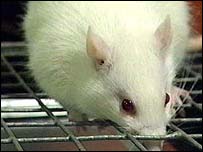AlbertPacino
Skilled

Scientists in the United States have discovered a gene that can keep mice alive for 30% longer than normal.
They say the gene has a key role to play in many of the processes related to ageing.
Because humans have a very similar version of the gene, the hope is that it will show a way to improve our declining years.
The gene studied in the new research is called Klotho, named after a minor Greek goddess who spins life's thread.
The gene certainly seems to do that. Mice - and people - with defective forms of the gene appear to age prematurely.
Now researchers have shown that by boosting the activity of the gene, they can extend the natural lives of male mice from two to three years.
The effect is not quite so strong in female mice.
Downsides
"It could be one of the significant steps for developing anti-ageing therapy," Dr Makoto Kuro-o, assistant professor of pathology at the University of Texas' Southwestern Medical Center and senior author of the study, told Science magazine.
Klotho seems to delay many of the effects of old age, like the weakening of bones, clogging of the arteries and loss of muscle fitness.
This is important for those researching the causes of ageing, whose intention is not so much to prolong life as to improve the quality of our final years.
But there may be downsides with Klotho. The long-lived mice in the new experiments tend to be less fertile.
And the gene may also predispose people to diabetes.
The trick for researchers will be to find ways of getting the life-enhancing results of Klotho while avoiding the drawbacks.
BBC News

